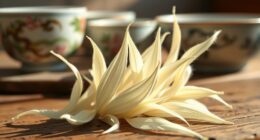I have always been intrigued by the advantages of natural remedies and holistic methods for health. A specific remedy that has piqued my interest is turmeric tea, a beverage made from the turmeric plant’s root that is renowned for its anti-inflammatory properties.
Turmeric tea has been used for centuries in Ayurvedic medicine to treat a variety of ailments, from digestive issues to skin conditions. In this article, I’ll be sharing everything you need to know about preparing and enjoying turmeric tea.
Firstly, we’ll explore how to choose the right kind of turmeric for making tea. Then we’ll dive into a basic recipe for making turmeric tea as well as some variations that you can try. Along with its delicious taste, there are numerous health benefits associated with consuming turmeric tea regularly – we’ll be discussing these in detail too.
However, it’s important to note that like any other food or drink, there are precautions you should take when consuming turmeric tea – we’ll cover these as well so that you can enjoy your cuppa without any worries!
Key Takeaways
- Choosing the right turmeric root is essential; look for bright orange roots with no mold or decay, firm and free from soft spots, smooth and shiny skin without wrinkles or blemishes.
- The basic recipe involves steeping turmeric and black pepper in hot water for 10 minutes and adding honey or lemon juice to taste.
- Turmeric tea has health benefits such as reducing inflammation, improving digestion, boosting immunity, and preventing chronic diseases like cancer and Alzheimer’s disease.
- Precautions when consuming turmeric tea include sticking to the recommended dosage, speaking with a healthcare provider if there are concerns, and being aware of potential side effects such as stomach upset, diarrhea, and adverse effects from taking concentrated doses of curcumin.
Choosing the Right Turmeric
First, you’ll want to make sure you’re choosing the right turmeric by selecting a bright orange root with no signs of mold or decay.
Turmeric sourcing is essential in preparing this tea because the quality of your turmeric root will determine the quality of your tea. You can find fresh turmeric roots at your local market or grocery store.
When choosing a piece of turmeric, look for one that is firm and free from any soft spots. The skin should be smooth and shiny, without any wrinkles or blemishes.
If possible, buy organic turmeric to ensure that it hasn’t been treated with any harmful chemicals. With good quality control, you can have the best ingredients for your basic turmeric tea recipe.
Basic Turmeric Tea Recipe
To make a basic turmeric tea, simply steep the spice in hot water with some black pepper for added absorption benefits. Did you know that curcumin, the active compound found in turmeric, has been shown to have anti-inflammatory effects similar to pharmaceutical drugs?
Here’s how to make it:
- Boil 4 cups of water in a pot.
- Add 1 teaspoon of grated or powdered turmeric and a pinch of black pepper.
- Reduce heat and let it simmer for 10 minutes.
- Strain the mixture into a cup and add honey or lemon juice to taste.
Drinking turmeric tea regularly may have various health benefits such as reducing inflammation, improving digestion, boosting immunity, and preventing chronic diseases like cancer and Alzheimer’s disease. However, it’s important to note that excessive consumption of turmeric can cause side effects such as upset stomach or allergic reactions. As always, consult with your healthcare provider before adding any new supplement or drink into your diet.
Now that you know how to make basic turmeric tea and its potential health benefits, let’s explore some variations of this delicious beverage!
Variations of Turmeric Tea
Let’s spice things up and explore different ways to jazz up your turmeric tea! One way to add some variety to your basic turmeric tea recipe is by experimenting with different spice blends. Some popular options include adding cinnamon, ginger, cardamom, or black pepper. Each of these spices has its own unique health benefits, so not only will you be adding flavor, but you’ll also be increasing the nutritional value of your drink.
Another way to mix it up is by trying out different flavor combinations. For example, if you enjoy a sweeter taste, try adding honey or maple syrup. If you prefer a more savory drink, consider adding a pinch of salt or a squeeze of lemon juice. And for those who like it creamy, try stirring in some coconut milk or almond milk. The possibilities are endless when it comes to creating your perfect cup of turmeric tea!
As we’ve seen, there are many ways to customize your turmeric tea recipe and make it uniquely yours. But beyond just being delicious and enjoyable to drink, this golden-hued beverage offers numerous health benefits as well.
Let’s dive into the next section and explore how drinking turmeric tea can support overall wellness and vitality.
Health Benefits of Turmeric Tea
I absolutely love drinking turmeric tea because it has amazing health benefits that help me stay healthy and happy.
It’s known to have anti-inflammatory properties that can reduce joint pain, muscle soreness, and swelling. The antioxidant properties of turmeric tea also help protect the body from oxidative stress and reduce the risk of chronic diseases such as cancer, heart disease, and Alzheimer’s disease.
Apart from these benefits, there are many others associated with turmeric tea, making it a great addition to my daily routine.
Anti-inflammatory Properties
Turmeric tea has been known to help reduce inflammation in the body, but did you know that it can also provide relief for conditions such as arthritis and asthma? The anti-inflammatory properties of turmeric are due to its active ingredient called curcumin. Curcumin is a potent antioxidant that reduces inflammation by inhibiting the production of inflammatory molecules in the body.
To fully understand the potential benefits of turmeric tea on reducing inflammation, let’s take a look at this table:
| Condition | Turmeric Tea Benefits |
|---|---|
| Arthritis | Reduces joint pain and stiffness |
| Asthma | Improves lung function and reduces airway inflammation |
| IBD | Helps reduce inflammation in the gut |
| Diabetes | Lowers blood sugar levels and improves insulin sensitivity |
| Heart Disease | Reduces oxidative stress and improves heart health |
As you can see from the table, turmeric tea benefits extend beyond just reducing inflammation. It also has positive effects on various health conditions such as diabetes and heart disease. In our next section, we’ll explore how turmeric’s antioxidant properties contribute to these benefits.
Antioxidant Properties
Now, it’s time to explore how this powerful ingredient helps your body fight off harmful free radicals with its antioxidant properties. Turmeric, the spice that gives curry its yellow color, is a potent antioxidant that can help protect against cellular damage caused by oxidative stress. Incorporating turmeric into your diet through drinking turmeric tea can provide numerous health benefits.
Here are three ways in which turmeric tea benefits your health:
-
Reduces inflammation: Turmeric contains curcumin, a compound known for its anti-inflammatory properties that may benefit those with arthritis or other inflammatory conditions.
-
Boosts immunity: The antioxidants found in turmeric can help bolster your immune system and ward off illnesses.
-
Aids digestion: Turmeric has been shown to stimulate bile production, aiding in digestion and helping to prevent digestive issues.
Other health benefits of turmeric go beyond just its antioxidant properties.
Other Health Benefits
Aside from its antioxidant properties, turmeric tea offers a range of other health benefits. One of the most popular benefits that people associate with turmeric tea is weight loss. Curcumin, the active ingredient in turmeric, has been shown to boost metabolism and reduce fat accumulation in the body. Incorporating turmeric tea into your daily routine can help you lose weight naturally without having to resort to fad diets or extreme workout regimens.
Turmeric also boasts anti-inflammatory and antibacterial properties, making it an excellent addition to your skincare routine. By incorporating turmeric into your masks or scrubs, you can soothe inflammation and redness while fighting off acne-causing bacteria. The antioxidants found in turmeric also help protect against free radical damage, which can lead to premature aging and wrinkles. So not only will drinking turmeric tea benefit your internal health, but it can also improve your skin’s overall appearance and health.
Moving on to precautions when consuming turmeric tea…
Precautions When Consuming Turmeric Tea
Before adding turmeric tea to my daily routine, I want to be aware of potential side effects and recommended dosage.
While turmeric is generally safe for most people, consuming too much can cause stomach upset or even ulcers. It’s important to stick to the recommended dosage and speak with a healthcare provider if you have any concerns about incorporating turmeric into your diet.
Potential Side Effects
It’s important to note that there can be some potential side effects associated with consuming turmeric tea, such as stomach upset and diarrhea. While turmeric is generally considered safe when consumed in small amounts through food, taking concentrated doses of curcumin (the active compound in turmeric) may lead to adverse effects.
Here are four potential side effects you should keep in mind:
-
Gastrointestinal issues: Consuming large amounts of turmeric or curcumin can cause gastrointestinal problems like nausea, bloating, stomach pain, and diarrhea.
-
Blood thinning: Turmeric has natural blood-thinning properties that can interfere with prescription medications or other supplements that have similar effects on the body. Excessive consumption of turmeric tea may increase the risk of bleeding.
-
Allergic reactions: Some people may experience allergic reactions to turmeric or its components. Symptoms may include hives, rash, itching, difficulty breathing, and swelling.
-
Iron deficiency anemia: Turmeric contains compounds called oxalates which can bind to iron and prevent its absorption by the body leading to iron deficiency anemia.
Despite these potential side effects, consuming moderate amounts of turmeric tea is generally considered safe for most healthy adults. It’s essential to follow recommended dosage guidelines and consult your healthcare provider if you have any underlying health conditions or are taking medications that could interact with turmeric tea before incorporating it into your diet regularly.
Recommended Dosage
To fully reap the benefits of turmeric tea, it’s important to know the recommended dosage. While there’s no one-size-fits-all approach, most experts recommend consuming 400-600mg of curcumin per day for optimal health benefits. This can be achieved by drinking 1-2 cups of turmeric tea daily.
It’s important to note that exceeding the recommended dosage may result in adverse side effects, such as stomach upset or increased risk of bleeding. However, when consumed in moderation, turmeric tea boasts numerous health benefits, including reducing inflammation and pain, improving brain function, and lowering the risk of chronic diseases. By incorporating this beverage into your daily routine at a safe and effective dosage, you can enjoy all the benefits of turmeric tea without any negative side effects.
When it comes to making the perfect cup of turmeric tea, there are a few simple tips to keep in mind. Always use high-quality ingredients, such as fresh ginger root and organic turmeric powder. Additionally, steeping your tea for at least 10 minutes will allow for maximum absorption of nutrients and flavor. With these tips in mind, you’ll be able to brew a delicious cup of turmeric tea that not only tastes great but also provides numerous health benefits.
Tips for Making the Perfect Cup of Turmeric Tea
When making turmeric tea, there are a few key tips to keep in mind for the perfect brew. First, it’s important to brew the tea for the proper amount of time – too little and you won’t get all of the health benefits, too much and it may become bitter.
Secondly, choosing the right temperature is crucial – boiling water can destroy some of turmeric’s active ingredients, so aim for a lower temperature around 160-170°F.
Lastly, don’t forget to strain your tea before drinking to ensure a smooth and enjoyable experience.
By following these simple steps, you’ll be able to enjoy all of the health benefits that turmeric has to offer in a delicious cup of tea.
Proper Brewing Time
For best results, I’ve found that the key to brewing a perfect cup of turmeric tea is allowing the turmeric to steep in hot water for at least 10 minutes. This brewing technique allows for the full flavor and health benefits of the turmeric to be extracted into the tea.
During this steeping duration, I recommend covering your tea mug or pot with a lid or saucer to keep the heat trapped in and intensify the extraction process. Not only does proper brewing time enhance taste and aroma, it also maximizes turmeric’s potential health benefits.
Turmeric contains curcumin, a powerful antioxidant known for its anti-inflammatory properties. By letting your tea steep properly, you can ensure that you’re getting all of these beneficial compounds in every sip.
Now that we’ve covered proper brewing time, let’s move on to choosing the right temperature for your turmeric tea.
Choosing the Right Temperature
Who knew that the temperature of your water could make or break your turmeric tea experience? Believe it or not, temperature control is a crucial factor in making the perfect cup of turmeric tea. The ideal temperature for brewing turmeric tea is around 205°F (96°C).
Here are some reasons why you should take note of the right temperature when preparing your turmeric tea:
- Using boiling water may destroy some of the active compounds found in turmeric, such as curcumin.
- Steeping turmeric tea at a lower temperature can help retain its medicinal properties.
- High temperatures can also result in a bitter and unpleasant taste.
- Lower temperatures can bring out more subtle flavors and aromas present in herbs and spices used to make the tea.
- Proper temperature control during steeping duration ensures that you get all the health benefits from drinking turmeric tea.
In addition to choosing the right temperature, another important aspect of preparing turmeric tea is straining it properly.
Straining the Tea
To get the perfect cup of turmeric tea, make sure to strain it properly, so you don’t miss out on any of the delicious flavors and benefits. There are different ways to strain your tea depending on your preference. Here’s a table that shows some options:
| Straining Method | Description | Pros | Cons |
|---|---|---|---|
| Fine Mesh Strainer | A small sieve with fine mesh wires used to catch particles. | Easy to use and widely available. | May not catch all particles. |
| Cheesecloth or Muslin Bag | A thin cotton cloth used to filter liquids and solids. | Can be reused multiple times and catches most particles. | Can take time to set up and clean afterwards. |
| Tea Infuser or Tea Ball | A metal ball filled with tea leaves or spices that is placed into a cup of hot water. | Convenient for individual servings, reusable, easy to fill and clean. | May not catch all particles and can be limited in size. |
If you don’t have access to a strainer, there are some alternatives you can try instead. One option is using a coffee filter; simply place it over your cup while pouring the tea through it slowly. Another alternative is using a French press; place the tea leaves or spices inside the press with hot water and then plunge down slowly after steeping for several minutes, which will also remove any sediment from the liquid.
When you’re finished enjoying your delicious turmeric tea, consider exploring other uses for this versatile spice such as adding it to soups or stews for an extra boost of flavor and health benefits!
Other Uses for Turmeric
I’m excited to explore other ways to incorporate turmeric into my life beyond just drinking it as tea.
One way is by cooking with it! Turmeric adds a warm, earthy flavor and a vibrant yellow color to dishes like curries, roasted vegetables, and even smoothies.
Another option is taking turmeric supplements, which can provide concentrated amounts of the active compound curcumin for potential health benefits such as reducing inflammation and improving brain function.
Cooking with Turmeric
Spice up your kitchen game by incorporating turmeric into your recipes; it’s like adding a ray of sunshine to your dishes. Not only does turmeric add a beautiful golden hue to any dish, but it also has numerous health benefits.
Here are five ways to incorporate this spice into your cooking:
- Add a pinch of turmeric to scrambled eggs for an added boost of flavor and color.
- Use turmeric in marinades or rubs for meats such as chicken or fish.
- Mix turmeric with coconut milk and other spices for a flavorful curry sauce.
- Sprinkle turmeric on roasted vegetables, such as cauliflower or sweet potatoes.
- Add some extra heat and flavor to soups and stews with the addition of turmeric.
Aside from its culinary uses, turmeric is also popular in skincare products due to its anti-inflammatory properties. However, please note that applying straight turmeric powder can temporarily stain the skin yellow. Instead, look for skincare products containing curcumin (the active ingredient in turmeric) or use caution when experimenting with homemade remedies.
While incorporating more turmeric into your diet through food and skincare can provide many benefits, sometimes taking supplements may be necessary for therapeutic purposes.
Turmeric Supplements
If you’re looking for a convenient and effective way to reap the benefits of turmeric, try incorporating turmeric supplements into your daily routine. Turmeric supplements come in various forms, including capsules, powders, and tinctures. These supplements contain high concentrations of curcumin, the active ingredient in turmeric that provides numerous health benefits.
Research has shown that turmeric supplements can help reduce inflammation, improve brain function, and even prevent certain types of cancer. In fact, one study found that taking a daily dose of 500 milligrams of curcumin for eight weeks reduced symptoms of depression as effectively as a common antidepressant medication. While more research is needed to fully understand all the potential health benefits of turmeric supplements, incorporating them into your diet can be an easy way to boost your overall health and well-being.
| Type | Form | Dosage |
|---|---|---|
| Capsules | Encapsulated powder | Typically 500-1,000mg per capsule |
| Powders | Ground or powdered form | Can be added to food or drinks; typically 1-2 teaspoons per day |
| Tinctures | Liquid extract made with alcohol or glycerin | Usually taken in drops (recommended dosage varies) |
When selecting a turmeric supplement, it’s important to choose a reputable brand and carefully read the label for dosage instructions. It’s also recommended to consult with a healthcare provider before starting any new supplement regimen. Overall, incorporating turmeric supplements into your daily routine can be a simple but effective way to support your body’s natural healing processes and promote optimal health.
Frequently Asked Questions
What is the recommended daily intake of turmeric tea?
When it comes to turmeric tea, the recommended daily intake is 1-2 cups. This tea has numerous benefits such as reducing inflammation and aiding digestion. However, excessive consumption may lead to side effects like nausea and diarrhea.
Can turmeric tea be consumed during pregnancy or while breastfeeding?
As a pregnant or breastfeeding individual, it is important to consult with a healthcare provider before consuming turmeric tea. Some studies suggest it may affect fertility and digestion, but more research is needed in this area.
How long does the turmeric tea stay fresh and effective?
Turmeric tea can stay fresh for up to 3 days when refrigerated. Drinking it regularly may provide anti-inflammatory and antioxidant benefits, aid digestion, and boost the immune system.
Can turmeric tea be mixed with other herbs or spices for added benefits?
Herbal combinations can enhance the benefits of turmeric tea. Ginger and cinnamon add flavor and anti-inflammatory properties, while black pepper boosts curcumin absorption. Personal taste preferences should guide herbal additions.
Are there any specific brands or types of turmeric that are better for making turmeric tea?
As the saying goes, "you get what you pay for."When it comes to turmeric tea, investing in high-quality brands like Organic India or Gaia Herbs can ensure maximum health benefits. Look for turmeric with a high curcumin content for optimal results.
Conclusion
In conclusion, preparing turmeric tea is a simple and enjoyable process that can offer numerous health benefits. As someone who’s struggled with inflammation and digestive issues, incorporating turmeric into my daily routine has been a game-changer.
Not only does it add delicious flavor to my beverages, but it also helps alleviate any discomfort I may be experiencing. One metaphor that comes to mind when thinking about the benefits of turmeric is that of a superhero. Just as superheroes have special powers to save the day, turmeric has unique properties that can help combat various ailments in our bodies.
From reducing inflammation and aiding digestion to boosting brain function and improving heart health, this spice truly packs a powerful punch. So next time you’re looking for something warm and comforting to sip on, consider brewing up some turmeric tea.
Your taste buds (and your body) will thank you!










